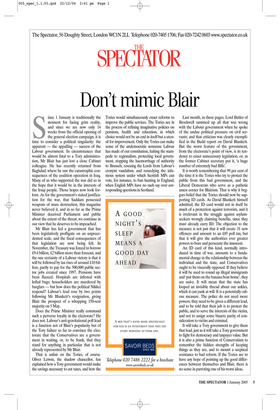Don’t mimic Blair
Since 1 January is traditionally the moment for facing grim reality, and since we are now only 14 weeks from the official opening of the general election campaign, it is time to consider a political singularity: the apparent — the appalling — success of the Labour government. In circumstances that would be almost fatal to a Tory administration, Mr Blair has just lost a close Cabinet colleague. He has recently returned from Baghdad, where he saw the catastrophic consequences of the coalition operation in Iraq. Many of us who supported the war did so in the hope that it would be in the interests of the Iraqi people. Those hopes now look forlorn. As for the government’s stated justification for the war, that Saddam possessed weapons of mass destruction, this magazine never believed it, and in so far as the Prime Minister deceived Parliament and public about the extent of the threat, we continue in our view that he deserves to be impeached.
Mr Blair has led a government that has been legislatively profligate on an unprecedented scale, and the fiscal consequences of that legislation are now being felt. In November, the Treasury was forced to borrow £9.4 billion, £2 billion more than forecast, and the one certainty of a Labour victory is that it will be followed by tax rises of around £10 billion, partly to pay for the 500,000 public sector jobs created since 1997. Pensions have been fleeced. Hospitals are infested with lethal bugs; householders are murdered by burglars — but how does the political Nikkei respond? Labour’s lead rose by two points following Mr Blunkett’s resignation, giving Blair the prospect of a whopping 150-seat majority on 5 May.
Does the Prime Minister really command such a perverse loyalty in the electorate? He does not. Labour’s anti-gravitational poll lead is a function not of Blair’s popularity but of the Tory failure so far to convince the electorate that the Conservatives are a government in waiting, or, to be frank, that they stand for anything in particular that is not already represented by Mr Blair.
That is unfair on the Tories, of course. Oliver Letwin, the shadow chancellor, has explained how a Tory government would make the savings necessary to cut taxes, and how the Tories would simultaneously enact reforms to improve the public services. The Tories are in the process of refining imaginative policies on pensions, health and education, in which choice would not be an end in itself but a utensil for improvement. Only the Tories can make sense of the undemocratic nonsense Labour has made of our constitution, halting the stampede to regionalism, protecting local government, stopping the haemorrhage of authority to Brussels, rescuing the Lords from Labour’s cronyist vandalism, and remedying the infamous system under which Scottish MPs can vote, for instance, to ban hunting in England, when English MPs have no such say over corresponding questions in Scotland. Last month, in these pages, Lord Butler of Brockwell summed up all that was wrong with the Labour government when he spoke of the undue political pressure on civil servants; and that criticism was clearly exemplified in the Budd report on David Blunkett. But the worst feature of the government, from the electorate’s point of view, is its tendency to enact unnecessary legislation, or, as the former Cabinet secretary put it, ‘a huge number of extremely bad Bills’.
It is worth remembering that 99 per cent of the time it is the Tories who try to protect the public from this bad government, and the Liberal Democrats who serve as a pathetic amen corner for Blairism. That is why it beggars belief that the Tories should now be supporting ID cards. As David Blunkett himself admitted, the ID card would not in itself be much of a protection against terrorists, and it is irrelevant in the struggle against asylumseekers wrongly claiming benefits, since they must already carry ID. The objection to the measure is not just that it will create 31 new offences and amount to an £85 poll tax, but that it will give the authorities ever greater powers to bore and persecute the innocent.
An ID card of this kind, normally introduced in time of war, amounts to a fundamental change in the relationship between the individual and the state, and Conservatives ought to be viscerally opposed. If they believe it will be used to round up illegal immigrants and ‘put them on the banana boat home’, they are naive. It will mean that the state has looped an invisible thread about our ankles, which it can yank at will. It is a potentially odious measure. The police do not need more powers; they need to be given a different lead, and to be told that their job is to protect the public, and to serve the interests of the victim, and not to assign some bizarre parity of consideration to victim and criminal.
It will take a Tory government to give them that lead, just as it will take a Tory government to fight for democracy and taxpayer value. But it is also a prime function of Conservatism to remember the hidden strengths of keeping things as they are, and to mount a sceptical resistance to bad reform. If the Tories are to have any hope of pointing up the good differences between themselves and Blair, there is no sense in parroting one of his worst ideas.







































 Previous page
Previous page